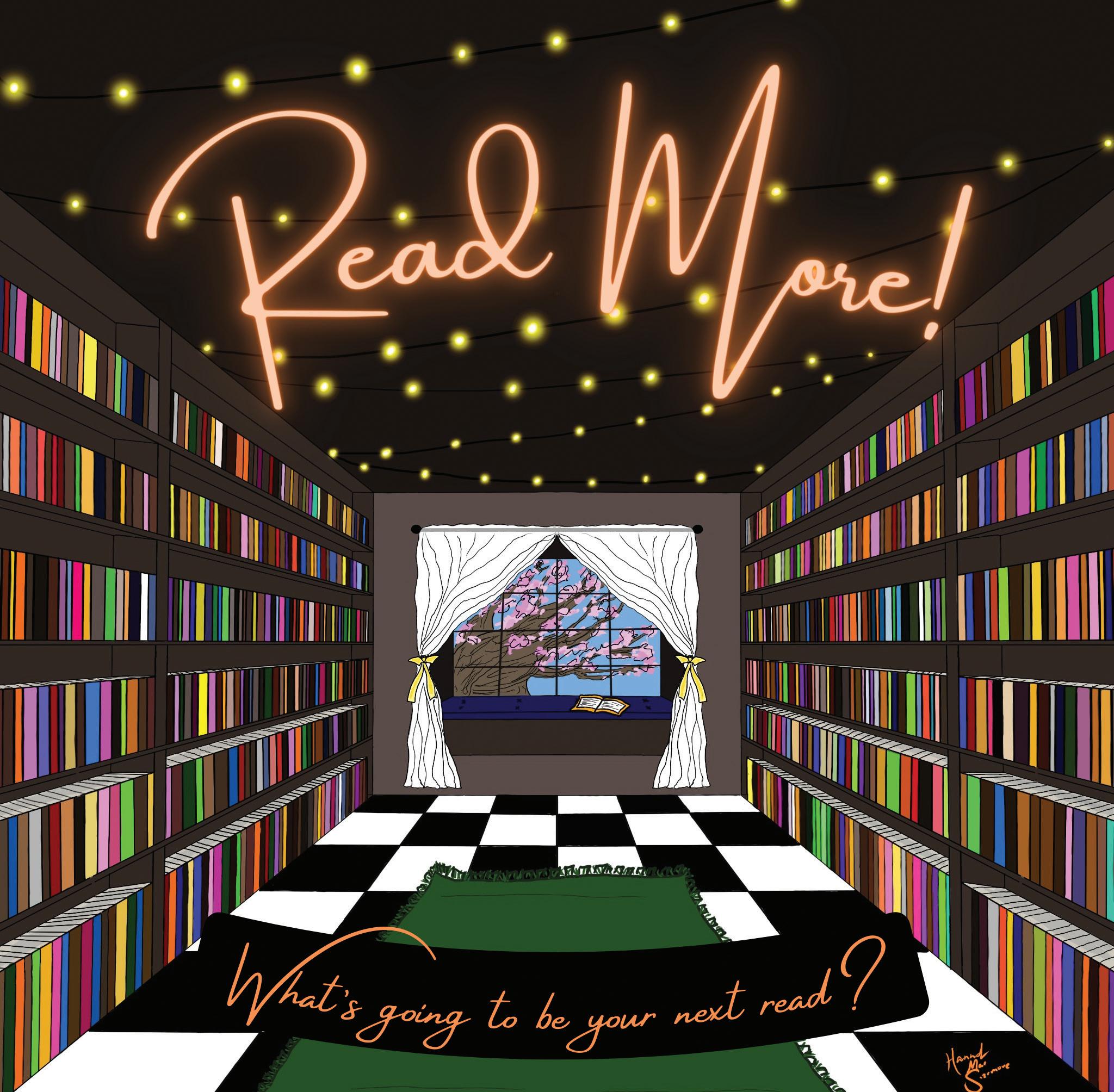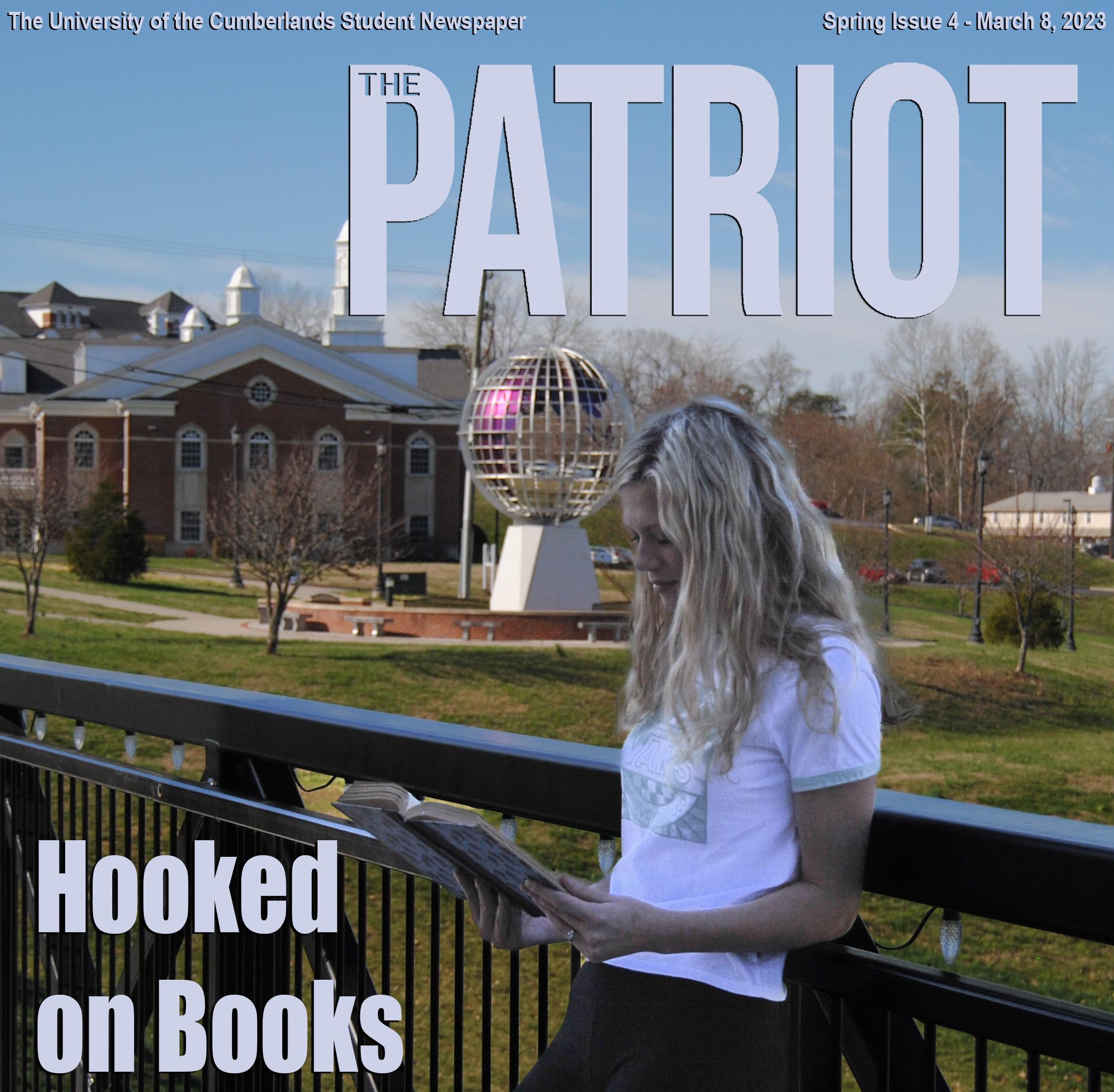

Letter From the Editor in Chief

Hello, book lovers!
If you love reading, you will be thrilled to hear that this issue is entirely book-themed! If you are not a fan of this hobby, I have two things to say to you. First, give reading a chance—there is the perfect book for you somewhere; you just need to find it. And second of all, do not put down this paper! This issue is for everyone, even those who do not consider themselves “bookworms.”
I am a proud bookworm; reading is my absolute favorite hobby! As an English and Communication Arts double major, I have a lot of (school) reading to do, but I am talking about a different kind of reading. I love to read fiction, primarily. Science fiction, contemporary stories, mysteries, fantasy—the list of my favorite genres goes on and on. But I also enjoy nonfiction, including autobiographies and spiritual growth books. I can read practically anything and find value within the work.
You may think, “I just don’t have the time to read.” And to be honest, that was how I felt last year. But there are ways to work reading into your schedule. Recently, I have been flying through audiobooks. I commute from London, so I spend my daily drive listening to novels on either Libby or Hoopla, two of my favorite apps allowing you to instantly access ebooks and audiobooks from your local library on your phone. Outside of my audiobook listening, I also schedule time on the weekends to spend on the latest story I am reading. Staying up late, fully engrossed in the plot of a novel, is one of the greatest feelings.
I encourage you to seek out the joy of reading. Make the time to immerse yourself in a unique world. Escape from stress by diving headfirst into an intriguing plot. Your new favorite book is just around the corner, waiting for you to seek it out. Happy reading, Patriots!
- Lacie DeGough

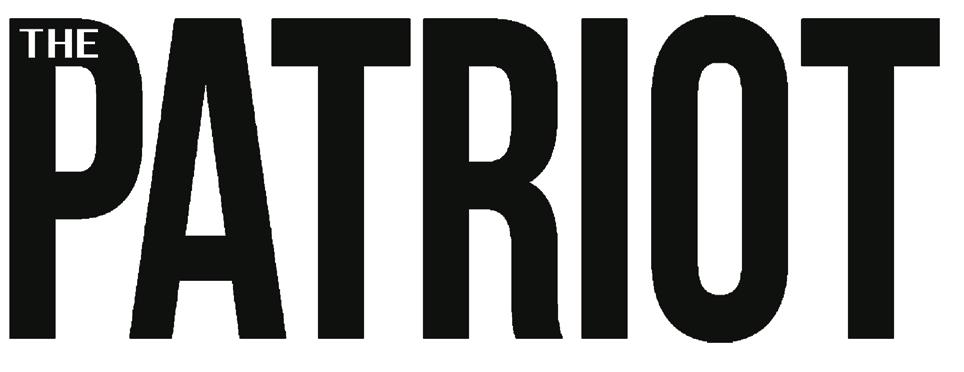
Editor-in-Chief
Lacie DeGough
Managing Editor
Summer Mills
Faculty Advisor
Jeremiah Massengale
Staff
Maddie Furtick
Amanda Gault
Tony Hensley
Anthony Cage Grubb
Cassidy Howard
Alyssa King
Amber Simpkins
Hannah Mae Sizemore
Emily Sloan
Front cover photo by Summer Mills
Back cover graphic by Hannah Mae Sizemore
Email comments, concerns or tips to:
thepatriot@ucumberlands.edu or call us at 606-539-4172
7000 College Station Drive
Williamsburg, Kentucky 40769
The Patriot is the student publication of the University of the Cumberlands. Our goal is to provide timely and original content by highlighting campus news and views.
Award-winning member of the Associated Collegiate Press and Kentucky Press Association.
Photo by Summer Mills
Forbidden Knowledge Book Bans Limit Knowledge and New Perspectives for Readers
BY AMBER SIMPKINS Staff Writer
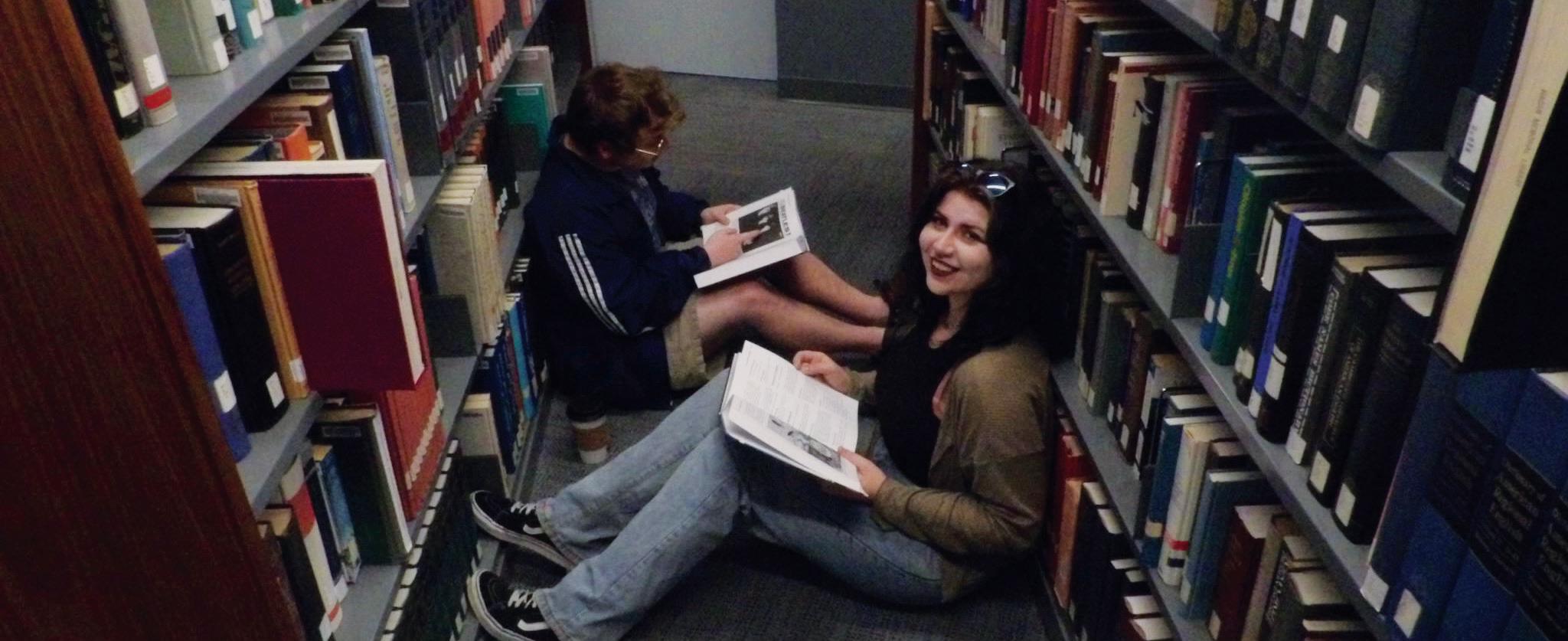
Book banning has happened throughout history, but it is starting to appear more frequently in the news. Book banning happens when groups such as the government, various organizations, or school officials remove books from public libraries, school libraries, and bookstores due to the content of the books. People who decide to ban the book believe it is too controversial or disagree with its messages or themes. Political agendas are mainly to blame for book banning. Unfortunately, the act of book banning limits the perspectives readers can have. Although some of the ideas may be deemed controversial to talk about in everyday society, those ideas in the banned books can still open the reader’s mind to a whole new perspective on life that they may have never faced. Having access to new life perspectives gives readers more to think about and lets them open their minds more to think for themselves.
Books get banned for many reasons, but as mentioned earlier, many are due to political agendas. The people that decide to ban books often ban them because the books go against their political agenda, which is very biased and limiting for readers. Books prohibited for political reasons are because they have a theme of questioning the government, authority, and how things are run. Another popular theme of banned books is telling a story from the perspective of a minority, such as someone who is an ethnic/racial minority or LGBTQ. Some books also contain themes of women’s struggles that often get banned. Another reason why some books get banned is due to religious reasons. For example, books such as the Harry Potter series have been banned in some places because of the themes of magic and sorcery.
Now, let us look at some examples of popular and recently banned books. One of the most popular banned books is 1984 by George Orwell. The book was banned for explicit content and supposedly being “pro-communist” even though the book was very anti-Soviet Union. 1984 was banned in the Soviet Union as well. Another book that has been popularly banned Maus by Art Spiegelman, which tells a story through the eyes of a Holocaust survivor. It was forbidden for nudity and profanity, despite the characters being portrayed as animals. Unfortunately, this ban censors an important part of history to learn. A recently banned book is The Hate U Give by Angie Thomas, which explores the topics of police brutality and racism. Unfortunately, some libraries have banned the book due to profanity and claims of an anti-police message. Another recent book that has faced banning is All Boys Aren’t Blue by George M. Johnson, which talks about the experience from the perspective of a boy that is LGBTQ but was banned from some libraries due to LGBTQ content.
It is unfortunate that these books have faced bans. These books offer different life perspectives to readers, as the themes in many banned books are important historical topics and topics that are important to understand in life. People must have the opportunity to learn about these different perspectives, even if the content may be deemed controversial. It may give readers a different view on a topic.
Photo by Tony Hensley
The Rise of Dune
Science Fiction’s Greatest Novel
BY ANTHONY CAGE GRUBB Staff Writer

Frank Herbert’s 1965 novel, Dune, is one of science fiction’s defining novels. Dune is set in the far future, where humanity has organized itself into an empire spanning the universe. The novel centers around Paul Atreides, the son of a powerful duke, whose family has been given the desert planet Arrakis, more commonly known as Dune, to rule over. The planet is perhaps the most valuable world in the Empire because of the spice Melange—a substance used to extend one’s lifespan, travel through space, and expand the consciousness of the human mind. This seemingly peaceful transition of power is a secret ploy to bring the end of House Atreides by the Emperor and the Harkonnens, the sworn enemies of House Atreides.
Paul is destined to play an essential role in the looming conflict because of the growing belief that he is the “Kwisatz Haderach,” a prophesied being who can unlock his genetic history and access the memories of his ancestors. This being, whom many believe is Paul, is also destined to free the oppressed people of Arrakis from the empire’s rule. These people view Paul as a messiah figure and test him to see if he matches the prophecy of the Kwisatz Haderach; he passes the test.
Not long after House Atreides establishes their rule ov er Arrakis, the Harkonnens, backed by the imperial army, attack the planet and overthrow House Atreides. Duke Leto, Paul’s father, is murdered. But Paul and his mother, Jessica, escape into the desert. Upon finding a group of Arrakis natives, known as the Fremen, Paul begins training to become the Kwisatz Haderach and overthrow the Harkonenns and the Emperor.
Dune, put simply, is a masterpiece of the 1960s and a must-read for science fiction fans. The novel is more than just an epic space adventure; it deals
with the themes of femininity, self-governance, technological advancement, and destiny. The oppressive rule of the Harkonnens and the Emperor is most notable because of its connection to modern-day events. Dune was published during the height of the Cold War, which stemmed from the conflicting ideologies of the United States and the Soviet Union. Herbert spends the entirety of his novel detailing the oppressive system of the Empire by exploring ideas of individualism, democracy, self-governance, and freedom—all of which are distinctly American characteristics.
Herbert continuously reflects on the idea of destiny and femininity by connecting Paul, the Bene Gesserit, and the Kwisatz Haderach figure. The imperial control of the Bene Gesserit, a group of female mystics, reflects the patriarchal ideas of society. Jessica, Paul’s mother, breaks away from the hold that the Emperor and the Bene Gesserit have on her and trains Paul in the mystical ways of the Bene Gesserit. In doing so, Jessica leads him to become the Kwisatz Haderach. This journey is Paul’s destiny, which is heavily referenced throughout the novel. Herbert uses these three concepts to show the interconnectedness of society and one’s destiny.
Ultimately, Dune is one of American literature’s finest pieces of work. Despite the novel being set in the far future, it reflects today’s society. Politics, religion, personal destiny, and innate desires collide to change the course of history drastically. Dune is a must-read for fans of science fiction, American literature, and stories of epic proportions.
Photo courtesy of Warner Brothers

Can You Find the Classics?
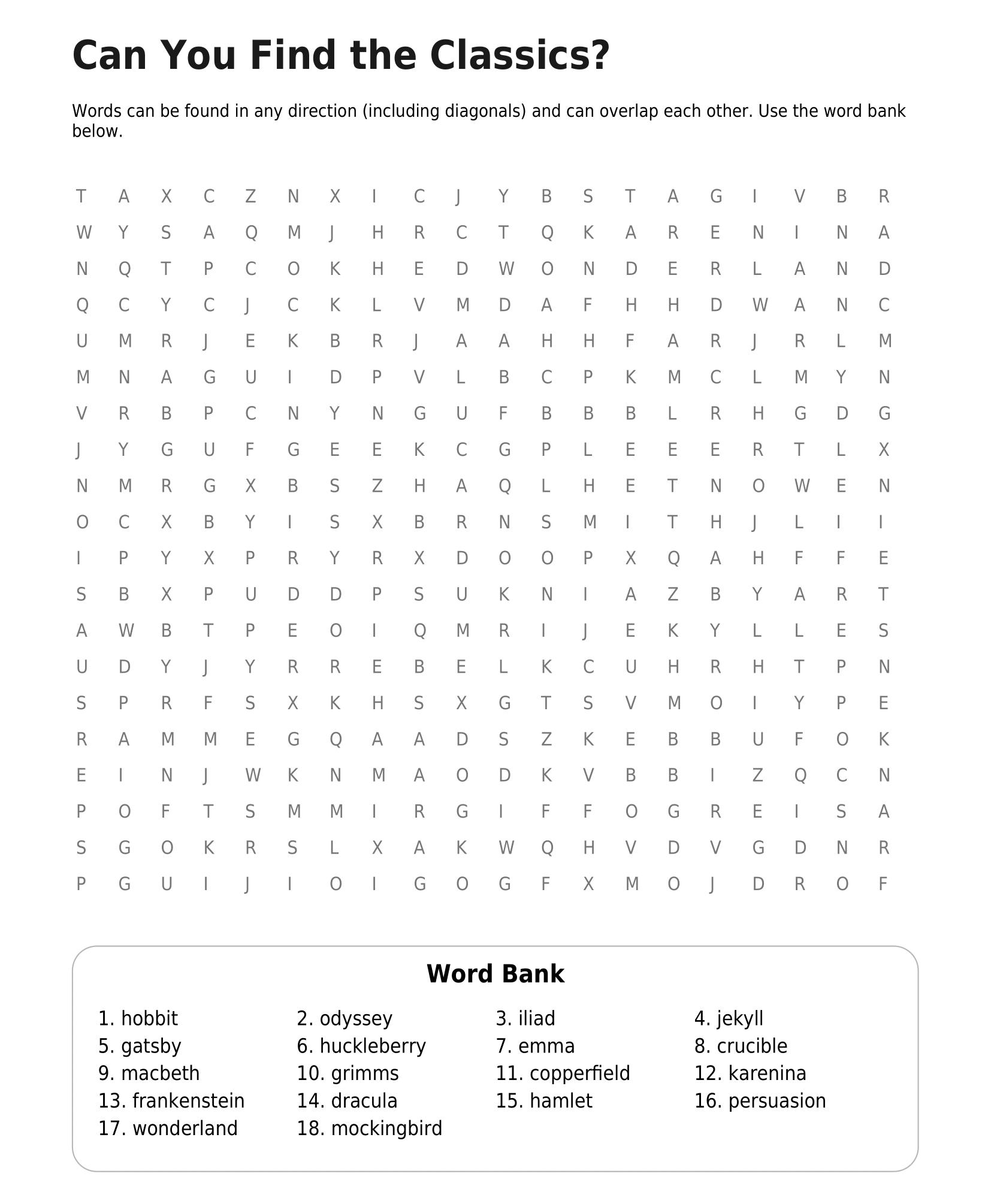
We have hidden key words from classic book titles in the word search below. How many of these classics have you read? How many words can you find?
Write Your Own Novel!
Tips for Drafting That Story You Have Always Dreamed Of Writing
BY ALYSSA KING Staff Writer

Have you thought about writing a book? Writing a novel is a complex thing to do, but there are ways to make it easier. Starting with a structure or outline is always a great idea. An outline would include elements like the main character, setting, character motive or goals, conflicts, changing point, plot development, crisis point, resolution, and theme. There are many different structures, such as the seven-point story structure. The seven-point story structure consists of a hook, the plot twist (puts your story in action), the first pinch point (where you introduce the antagonist/tension), the midpoint (where your character problem solves), the second plot twist, the second pinch point, and the resolution.
Any structure or outline you choose must fit into your selected genre. Some examples include horror, romance, comedy, fantasy, mystery, science fiction, action, and historical fiction. Different genres may have specific setups that are needed. For example, some mystery novels need a strong hook for the readers to be interested in the rest of the book.
Once you start your book, you must establish a time and place to continue writing. It is helpful for some people to have a certain desk or room dedicated to their writing time. To stay motivated, try setting a goal of 1,000 words daily or at night. If you are not interested in the book you have started, your readers will probably not be interested. So, make writing your book enjoyable for yourself! Writing exercises can be a fun way to get through writer’s block. Some exercises you can try are writing prompts that you can find on Google or Pinterest.
The area or areas for your writing time should consist of a calm and quiet place where you are most comfortable and can do your best work. These areas might include the library, dorm room, or a friend’s house. It is best to make sure that plenty of snacks and water are at your disposal. Writing can be very time-consuming and make getting up for a snack difficult if you are too focused and stressed. Taking breaks often is essential for your mental health. When you focus on something too long, your brain gets tired and stops thinking completely.
Another excellent tool for when you start writing your novel is research. It may sound simple, but research can help develop character personality types, accurately explaining certain events through common sense and science and creating complex situations for characters to interact with. Do this cautiously, though; you do not want FBI agents at your door because you looked up how to make a nuclear bomb! Typically, research is done before starting your first draft, but it can be helpful at any point in the writing process.
So have fun, brainstorm, research, edit, and revise! Most importantly, take breaks when you need to. When you complete your final draft, remember to ask for feedback from your peers before publishing.
Photo by Alyssa King
I Have Hated the Words and I Have Loved Them
The Book Thief by Markus Zusak Is
an Emotional Journey
LACIE DEGOUGH Editor in Chief

A story narrated by Death; a story set in Nazi Germany during World War II; a story defending the inherent worth of all human beings— The Book Thief by Markus Zusak delivers on these promises and more. This novel provides readers with an incredible story, well-developed characters to grow close to, and a history lesson—all wrapped up in one book with moving scenes and poetic prose. The story, published in 2005 and considered to be a classic piece of artistic literature ever since, is set in Germany in the 1930s and 40s. In The Book Thief, Zusak examines the effects of Hitler’s horrendous acts on both the persecuted Jews in Germany and the Germans who resisted his commands.
Zusak’s characters are incredibly memorable. The main character is Liesel Meminger, a young girl who is left alone in the world after the death of her brother. She is taken to live with Hans and Rosa Hubermann, her new foster parents. Rosa is portrayed as a stern but loving woman who constantly chastises Liesel. Hans, on the other hand, is a kind man who grows close to Liesel as the story progresses. Rosa and Hans display their love for Liesel in dramatically opposite ways, but by the end of the novel, it is clear that they both care for her very much.
The story takes a dramatic turn when the Hubermanns take in a young Jew named Max. They hide him in their basement, where Liesel spends hours getting to know him, watching as he writes stories about his life as a Jew in Nazi Germany. Max is a bright light in the Hubermann’s lives. They put themselves in great danger by hiding him from the
Nazis, but they know that they are doing what is right. The Hubermanns defy Hitler in many ways throughout the story, but the choice to shelter Max from harm is the biggest and most important step that they take.
Markus Zusak’s writing style is nothing short of genius. Death—the narrator of the story— constantly interjects his own small poems into the prose, breaking up the monotony of narration with short insightful comments on the story and humanity as a whole. Death also discusses the things that are to come in the story. He spoils which characters are going to die, then moves on as if the revelation has no consequence. His references to future events keep readers on their toes, surprising them at every turn.
The Book Thief is a masterpiece. Zusak has the remarkable ability to make readers laugh one second and cry the next. This novel is incredibly touching, reminding readers of the value of human beings and the beauty of forming deep, meaningful connections with close friends and family. The book also discusses the impact that words have on a person. In the end, Liesel writes about her relationship with the English language, saying, “I have hated the words and I have loved them, and I hope I have made them right.” This quote sums up Zusak’s writing in The Book Thief. He experiments with writing styles, mixing poetry and prose until it seems natural to readers. His experiments are not always successful—some of his writing admittedly feels pretentious—but by the end of the novel, it is clear that Zusak is a master of the English language.
Reading! on Spotify
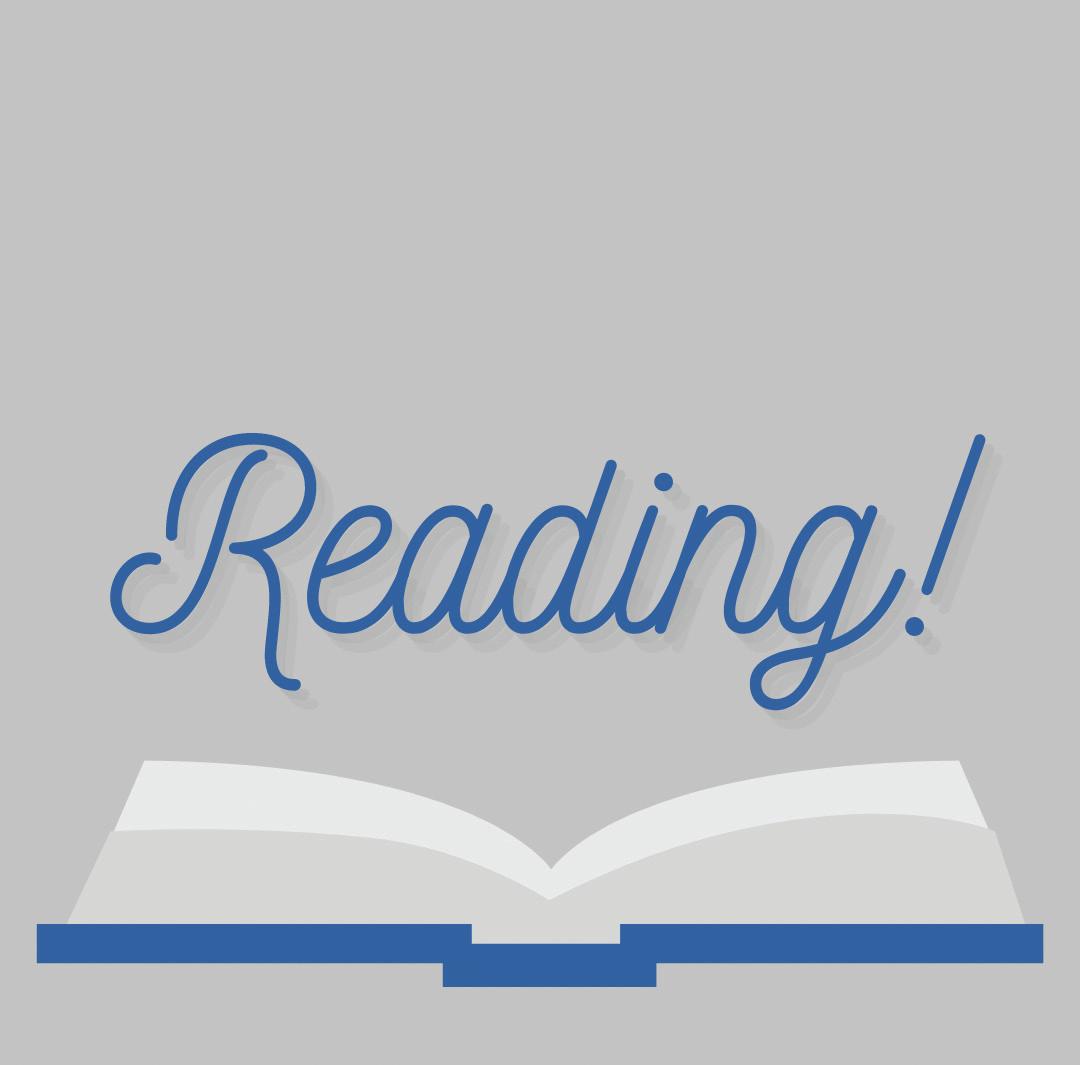
Shuffle this playlist for a mix of rain sounds, piano, jazz, and classics. This is the perfect playlist to listen to while reading!
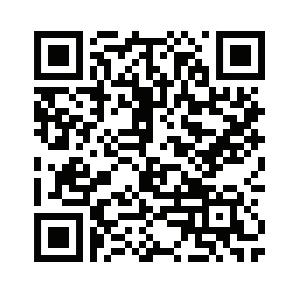
Photo courtesy of 20th Century Fox
Graphic by Lacie DeGough
